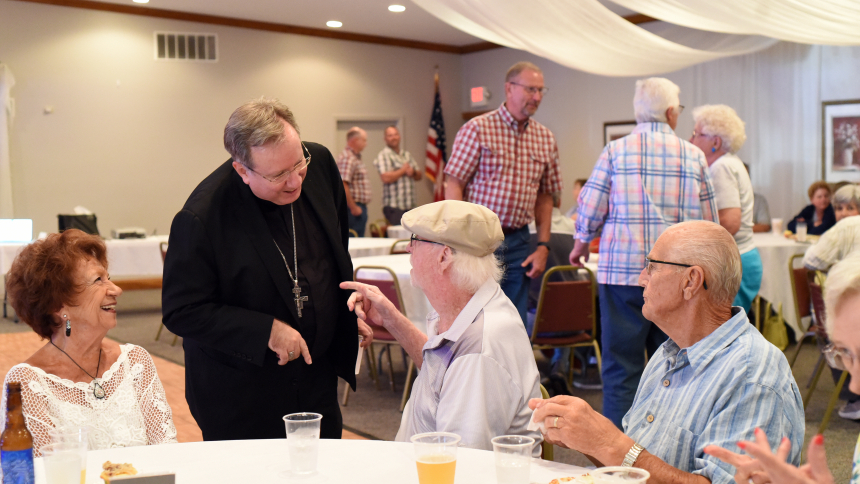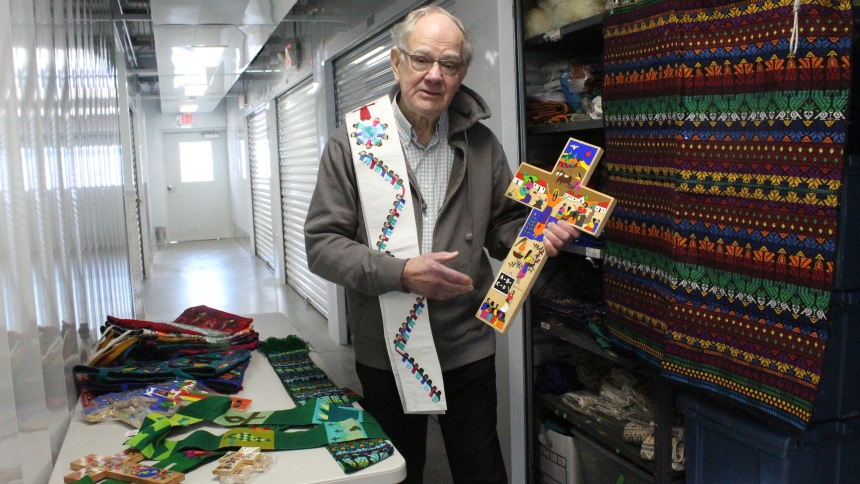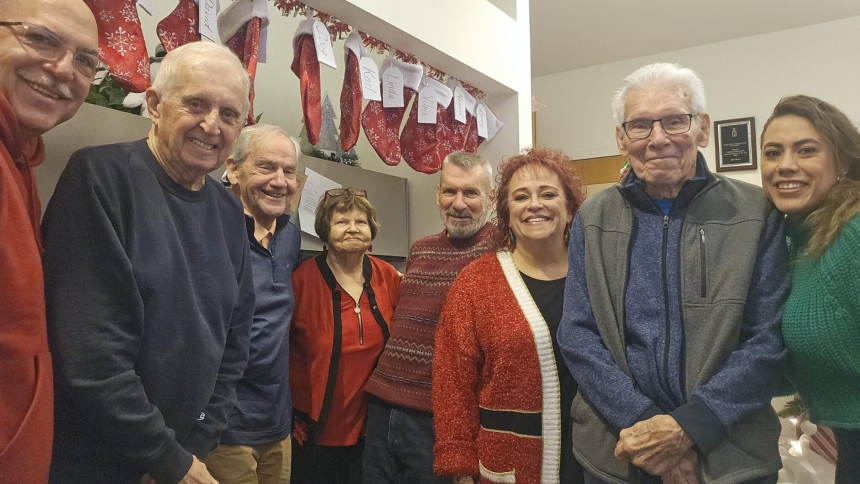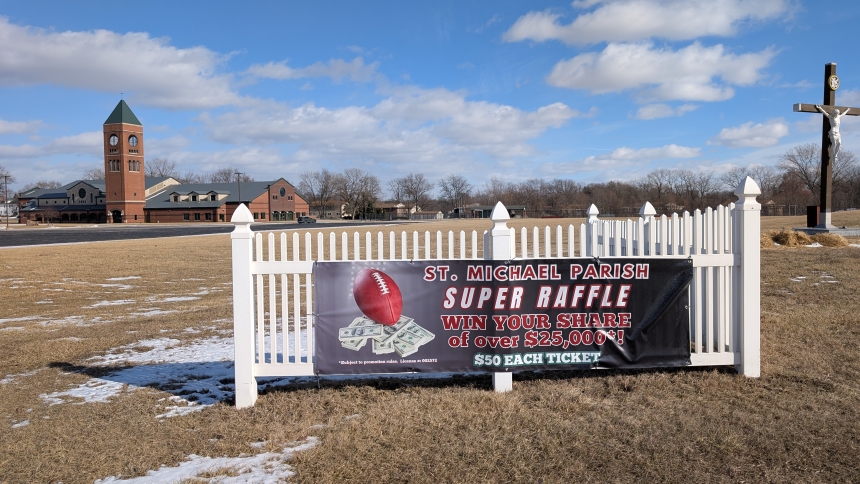
WANATAH – In one evening session of Pub Theology held at American Legion Post 403, Bishop Robert J. McClory presented guests with an overview of salvation history and reminded today’s faithful of the new covenant of Jesus and the sacrament He instituted to sustain His people.
At the event sponsored by the Catholic Communities located at the eastern extent of the diocese, Bishop McClory began with a prayer of thanksgiving “for the great gift of the Eucharist” and those gathered at the event.
He introduced himself and his story, citing the deep faith of his family from metropolitan Detroit and the experiences that led him to a close relationship with the Lord and, eventually, a priestly vocation centered on a belief in the Eucharist “that changes everything.”
“The Eucharist is a great topic to talk about today because the Church is entering a Eucharistic Revival, particularly in the United States over the next three years,” the bishop said. “This is going to culminate with a national Eucharistic Congress – a fancy way of saying a meeting of Catholics from all around the country in Indianapolis next July.”
Bishop McClory delivered a talk with lively anecdotes, yet also thoroughly apologetic – providing scriptural and Early Church Fathers’ corroboration for the belief in the breaking of the bread.
“When I would talk to kids (when I was a pastor), I would ask, ‘What is it like to be hungry?’” the bishop explained. “The little kids would say answers like, ‘Well, when you’re hungry you’re tired.’”
Citing a contemporary portmanteau, or word combination, the bishop said, “Here’s the word for that now: ‘hangry.’”
He added, “That restlessness of hunger can really affect some.”
Then the bishop spoke about the mystery of the Eucharist and the opposite feelings one has when they are well nourished: “satisfied,” “attentive,” and “having what we need.”
Bishop McClory said when Jesus sought to feed the faithful in a real and divine way, the introduction was something many did not accept.
“So when we think about the gift of the Eucharist, Jesus gave some of his most startling and shocking revelations about His Body and Blood, particularly in the Gospel of John.”
John 6 details a group of disciples finding Jesus in Capernaum where the Lord told them in verse 35, “I am the Bread of Life; whoever comes to Me will never hunger, and whoever believes in Me will never thirst.”
In the discourse, the Jews began quarreling, especially when Jesus reminded them that their “ancestors ate manna in the dessert but died,” and further proclaimed in verse 51, “I am the living bread that came down from heaven; whoever eats this bread will live forever; and the bread that I will give is my flesh for the life of the world.”
Bishop McClory pointed out the real, not metaphorical language Jesus used when he instituted the Holy Eucharist. “Jesus always takes the time to explain the parables,” he said, referencing the symbolic nature of those lessons.
But when He spoke of himself as the Bread of Life, the bishop recalled that Jesus said, “Does this shock you?” The Lord offered no rhetorical way out of phrases like, “Eat my flesh and drink my blood.”
Bishop McClory noted that many in the crowd around the Lord argued, “This saying is hard; who can accept it?” And some departed from Jesus, the diocesan shepherd added.
In his condensed overview, the bishop cross referenced the synoptic Gospels – Matthew, Mark, Luke – and the Catechism of the Catholic Church presenting these references as proofs, he laid out defenses of the faith that have long represented the Church’s answers to Protestants and others who do not believe in the Real Presence.
The bishop also went back to the Old Testament, citing Moses’ order to place the blood of the lamb on the wood above the people’s doors so that “death would pass over their houses,” as a foreshadowing of Jesus’ mission. And he said John the Baptist introduced Jesus not as “Hey, this is my cousin, he’s a nice guy,” but rather, “Behold the Lamb of God.”
That symbolism is also used in the “culminating image” of the Book of Revelation, the Wedding Feast of the Lamb, according to Bishop McClory.
“We believe that the Holy Sacrifice of the Mass opens us up now to a foretaste of that divine experience of that liturgy and right now pulls us in,” said the bishop.
To further show the congruency of the Catholic Church’s longtime practices, Bishop McClory read narratives that St. Justin Martyr wrote to Emperor Antoninus Pius in the year 155 A.D., urging tolerance from the Roman leader for the growing, but peaceful group who followed the teachings of Christ.
“On the day we call the day of the sun, Sunday, all who dwell in the city or country gather in the same place … the writings of the Apostles and prophets are read …” Bishop McClory read from the historical narrative. “Then the one who presides takes the bread and wine and offers praise and glory to the Father of the Universe through the Name of the Son and of the Holy Spirit … all present give voice to an acclamation by saying, ‘Amen’ … then those who we call deacons give to those present the Eucharistic bread.”
The bishop told the audience that faith and fidelity to these beliefs can be a panacea for the hunger in our hearts and the problems in today’s world.
"For we who have come to know this truth, now is the time to challenge ourselves to grow in our own Christian piety … because God has a mission for us: he doesn’t want us to be tired and lonely, he wants us to be strengthened and fed.”
Kathy Turner, who gathered at the presentation with fellow St. Mary Otis parishioners, including Joan Murphy, enjoyed conversation and refreshments before heading home.
“I told the bishop that this was a nice, condensed version – like I’d never heard before, connecting all the dots about salvation, Turner said.
Deacon Dale Walsh who ministers to the parishes of St. Mary, Sacred Heart, Wanatah, and St. Martin of Tours, LaCrosse, said the route to proper catechesis starts at home.
“An interesting part was when a catechist asked the bishop, ‘How do we (teach) these things to a third-grader?’ and he said, ‘Parents need to be involved.’”



